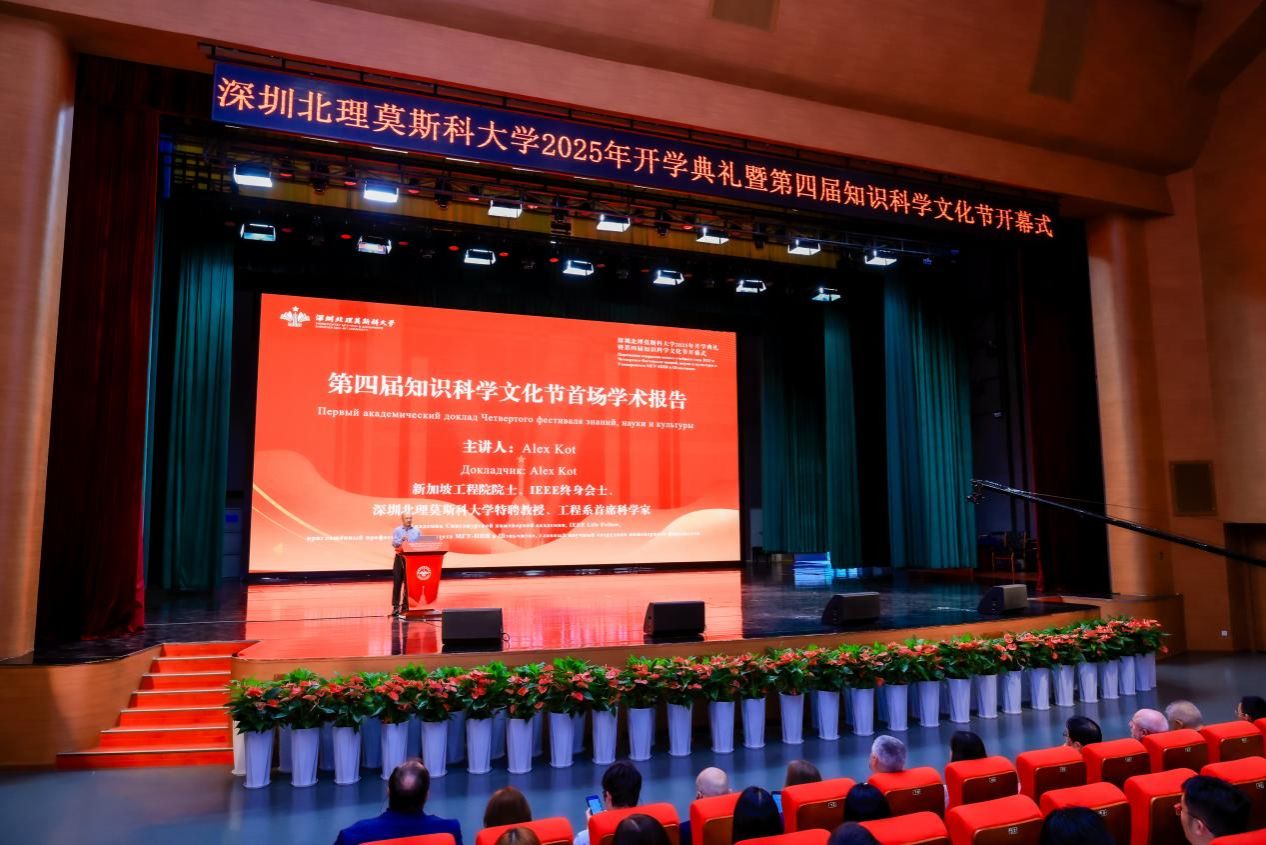With the crisp autumn breeze and a season full of harvest, Shenzhen MSU-BIT University (SMBU) grandly held its 2025 Opening Ceremony and the Opening of the Fourth Knowledge, Science and Culture Festival on September 13. Nearly 1,500 new undergraduate and graduate students gathered to embark on a new academic journey, ready to write a new chapter in their lives at SMBU.
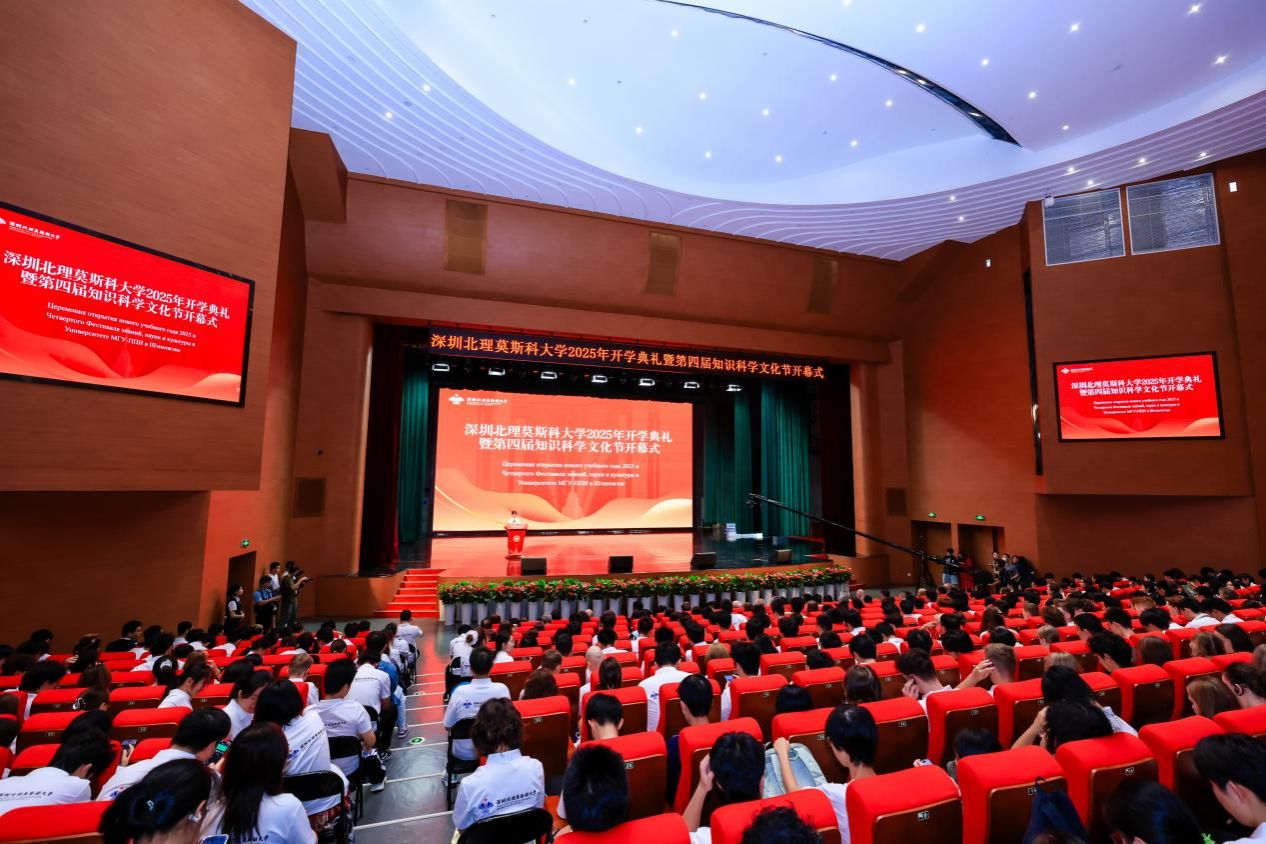
The ceremony consisted of two sessions: the undergraduate session in the morning and the postgraduate session in the afternoon. President and Deputy Party Secretary Li Hezhang, First Vice President and Chair of the Academic Committee Sergey Ivanchenko, and Deputy Party Secretary and Secretary of the Discipline Inspection Commission Chen Chaofeng, together with faculty representatives and guests from various sectors of society, attended the event. The ceremony was hosted by Xiao Yuan, counselor from the Student Affairs Department. The event was held both online and offline, with live broadcasts on the university’s official video channels, CCTV Video, and Douyin, attracting nearly 100,000 views across all platforms.
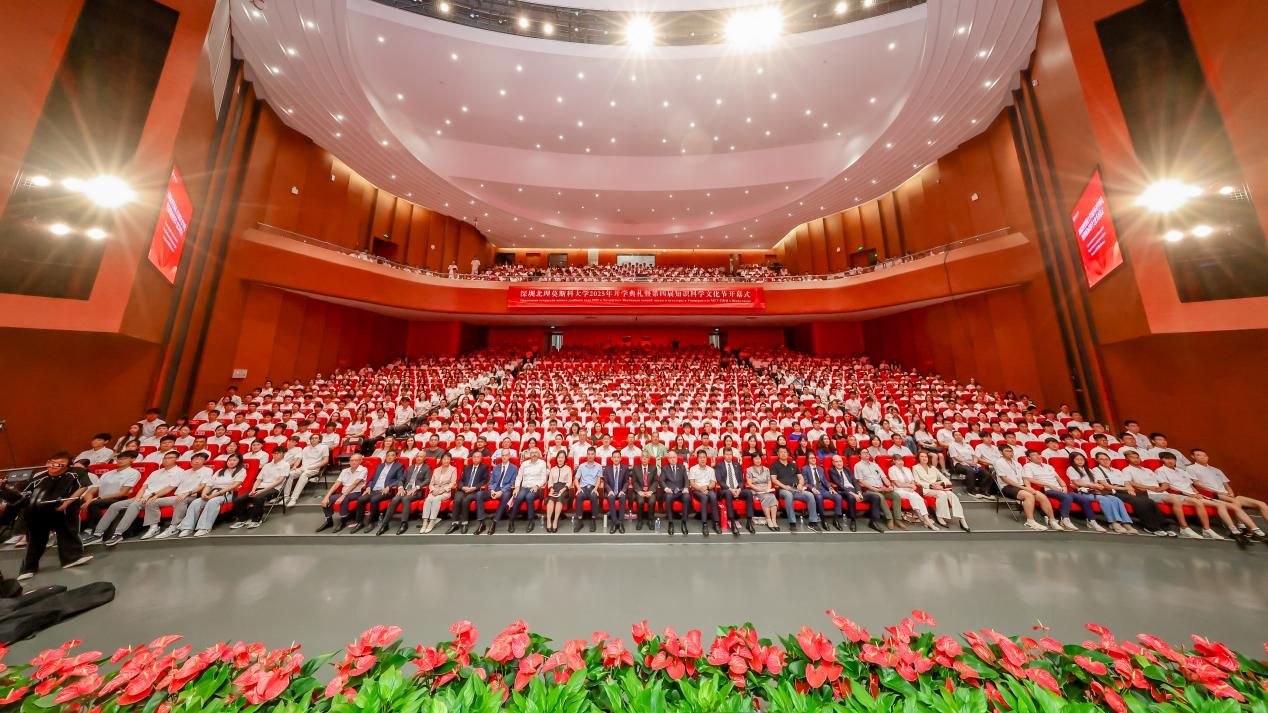
The performances opened with the dances “Red Silk Fan Dance” and “Dream Chaser,” followed by the songs “Awaken and Sing” and “Moscow Square Dance.” Students from the Art Center and the Faculty of Philology delivered a series of vibrant and captivating performances, igniting the enthusiasm of the entire audience. A short film titled “We’re Starting Our Journey!” captured memorable moments from the freshmen’s first days on campus, with every smiling face radiating the joy and excitement of youth.
As the national anthems of China and Russia resounded solemnly through the hall, the opening ceremony officially commenced.
At the undergraduate session, Professor Tian Yubin, Chinese Director of the Faculty of Computational Mathematics and Cybernetics, addressed the new students as the faculty representative. He shared three expectations for their university journey: First, he encouraged students to pursue excellence with ambition, to set great goals, climb new heights, and bravely shoulder their mission in building China into a powerhouse of science and technology—striving to let the voice of Chinese youth be heard on the global stage. Second, he emphasized the importance of perseverance, noting that learning is a challenging yet rewarding journey. Only through consistency, diligence, and reflection can one achieve true personal growth. Third, he urged students to build confidence and embrace challenges, citing examples of outstanding mathematics graduates who have gone on to pursue doctoral studies at Moscow State University and gained recognition from leading enterprises. He encouraged everyone to believe that “everything is possible.” Professor Tian expressed his hope that students would broaden their horizons in a multicultural environment, gain insight into technological trends through coursework and practice, and grow into talented individuals with both national commitment and global vision.
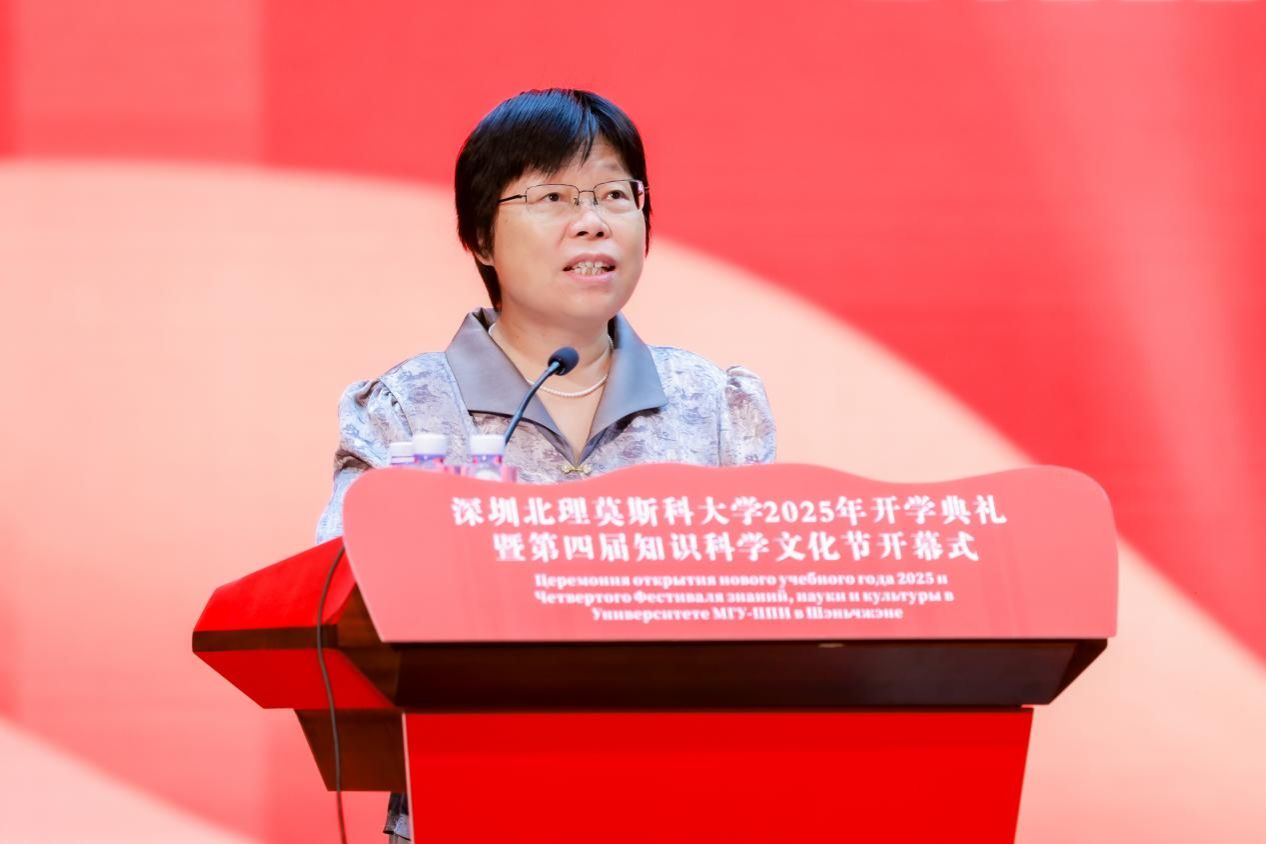
At the graduate opening ceremony, Professor Mikhail Karpov, Director of the Eurasia Research Center, delivered a speech as the faculty representative. He shared his personal experiences of studying and working in China, encouraging students to cherish their learning journey at Shenzhen MSU-BIT University (SMBU) and to make it a defining chapter in their personal growth, professional development, and life path. Professor Karpov noted that since its establishment, SMBU has evolved from a high-level cooperative initiative into a truly international university with growing influence and recognition across Asia and Europe. He urged new students to make full use of this platform, actively engage in bilingual learning and cross-cultural communication, build deep friendships, expand their global perspective, and take on the role of cultural ambassadors promoting friendship between China and Russia.
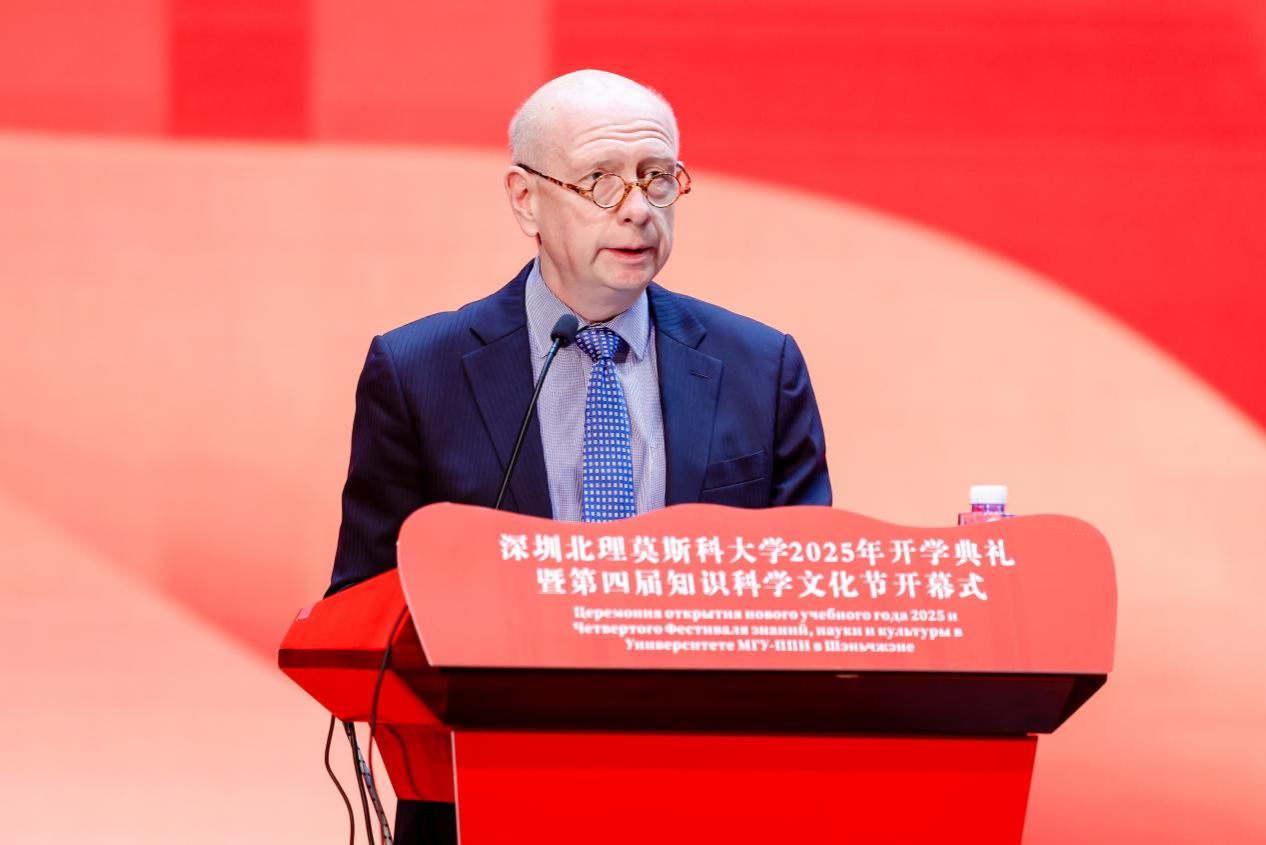
Chen Zhaoru, an undergraduate student from the Faculty of Chemistry, Class of 2025, delivered a speech as the representative of the new undergraduate students. She shared her understanding and expectations of Shenzhen MSU-BIT University (SMBU) and the spirit of being a “SMBUer” from three perspectives: the university’s educational mission, students’ attitude toward learning, and their personal growth through practice. She called on all new students to embrace the spirit of SMBU as part of their identity, to plant the seeds of China–Russia friendship in their hearts, and to pursue their lofty dreams with youthful passion and steadfast action. “With perseverance and purpose,” she said, “we will make the Star of SMBU shine ever brighter through the dedication and effort of each one of us.”
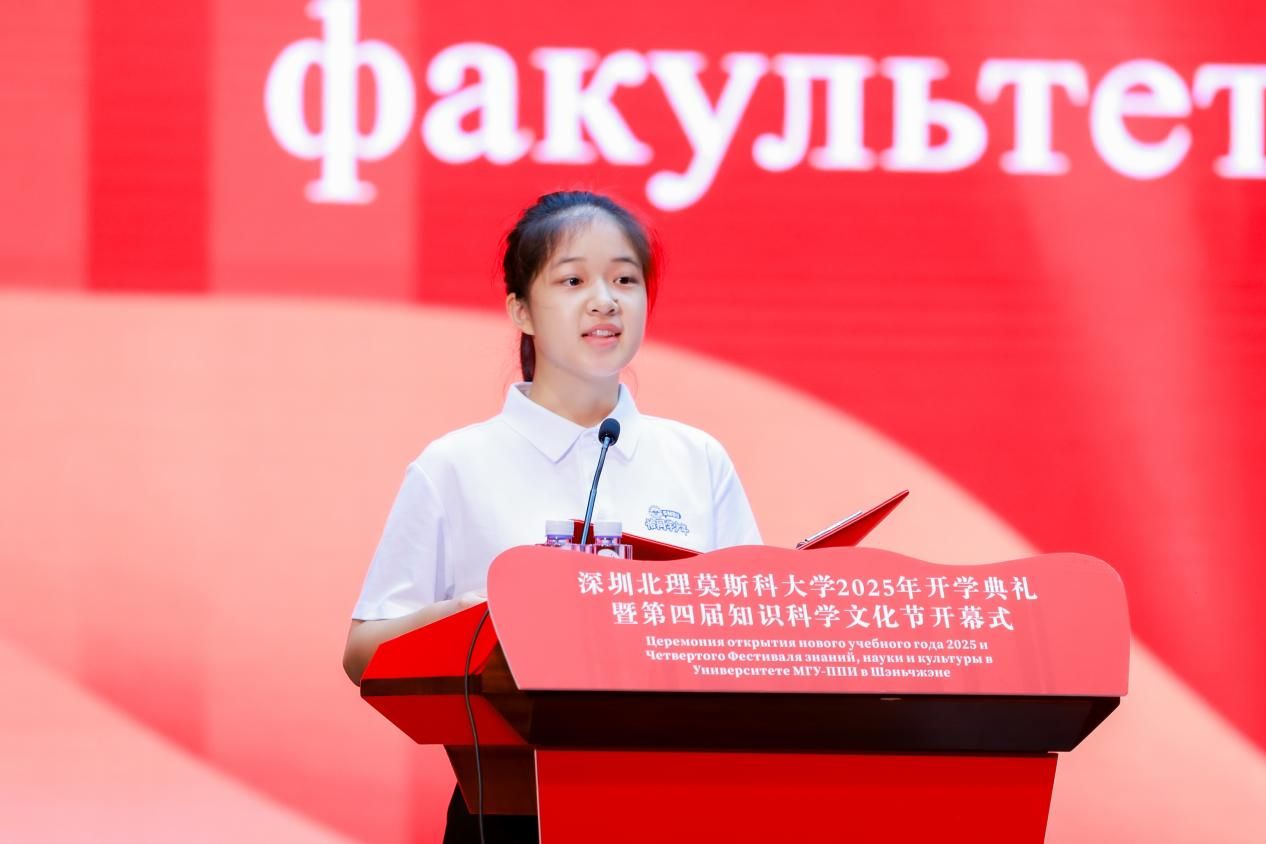
Sofya Golyanova, a master’s student from the Class of 2025 at the Eurasia Research Center, delivered a speech as the representative of the new graduate students. Drawing on her four years of undergraduate study and life experiences in Shenzhen and at SMBU, she reflected on her personal growth and achievements, and shared her aspirations for the next stage of her academic journey. “I wish all our teachers endless patience and inspiration, and I hope every student breezes through exam season and enjoys a fulfilling life! May our shared journey be filled with mutual respect, creative exploration, and outstanding academic accomplishments,” said Golyanova.
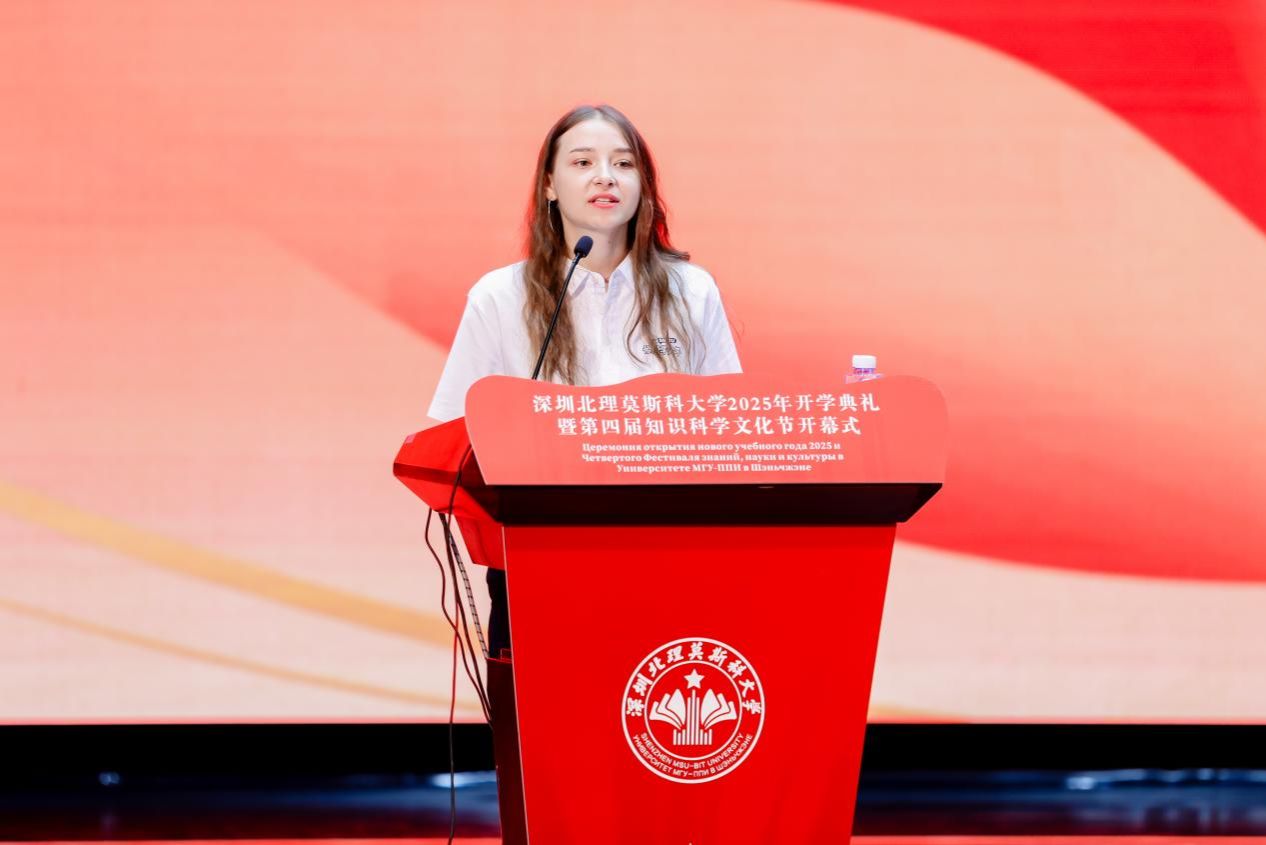
At the undergraduate opening ceremony, Fang Kuiming, Party Secretary of Shandong Experimental High School, delivered a speech as a special guest representative from secondary education, offering his heartfelt wishes to the Class of 2025 freshmen. At the undergraduate opening ceremony, Fang Kuiming, Party Secretary of Shandong Experimental High School, delivered a speech as a special guest representative from secondary education, offering his heartfelt wishes to the Class of 2025 freshmen. He expressed three hopes for the new students: First, that they will maintain clarity of thought and independence of character, using systematic thinking and rational spirit to meet the challenges of the information age. Second, that they will cultivate steadfast strength, building core competencies through solid learning and practical experience. Third, that they will embrace great aspirations, aligning personal growth with national development, and contributing their youthful energy to the cause of China’s scientific and technological self-reliance. Fang Kuiming also spoke highly of Shenzhen MSU-BIT University’s role in integrating Chinese and Russian educational resources and supporting national strategic goals. He expressed his hope that the university will continue to grow as a driving force for technological innovation in the Greater Bay Area, nurturing outstanding talents for the nation’s future.
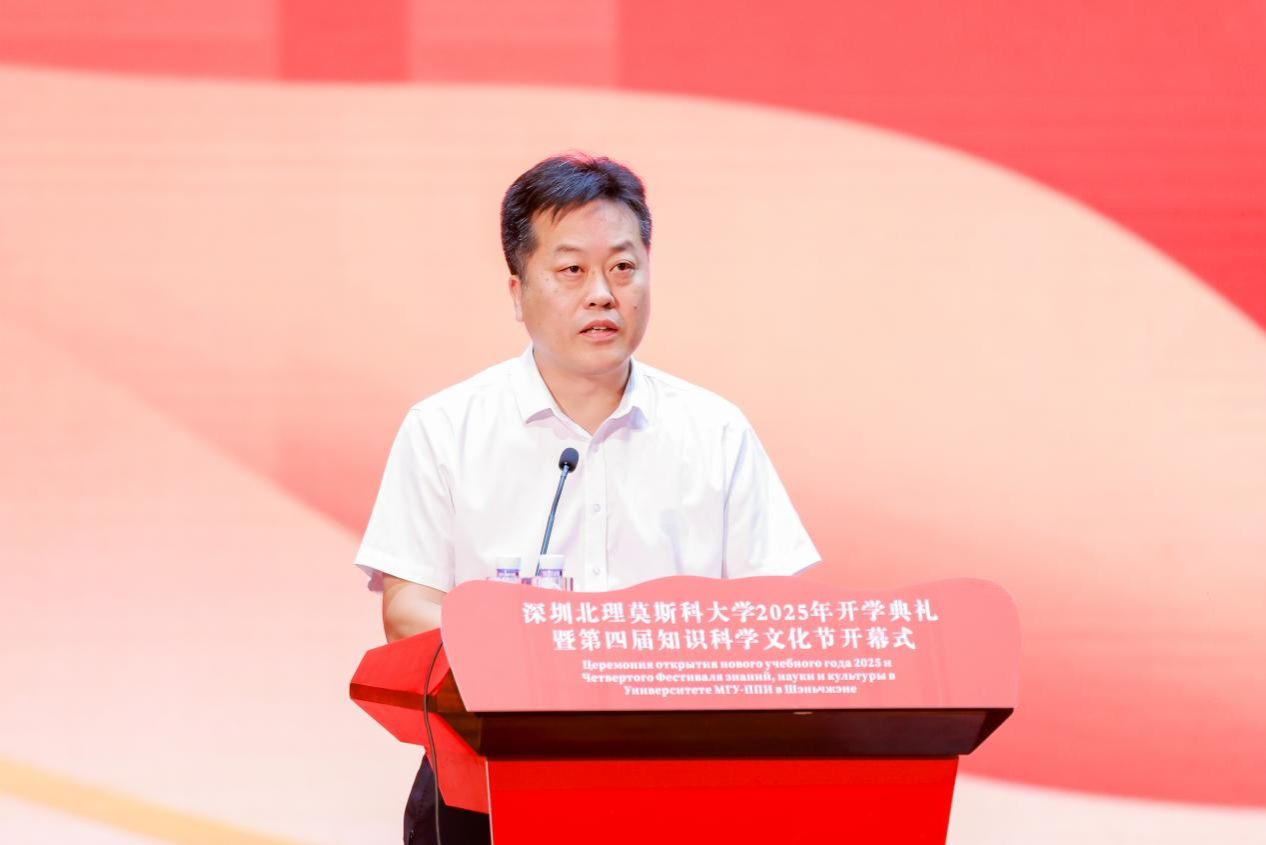
University leaders and heads of faculties and centers present student ID cards to representatives of the Class of 2025 undergraduate students.
University leaders and heads of faculties and centers present student ID cards to representatives of the Class of 2025 graduate students.
At the undergraduate opening ceremony, President Li Hezhang delivered a speech titled “Carrying the Legacy of Sino-Russian Civilization, Exploring the Realm of Scientific Truth, and Opening the Door to an Innovative Future.” He elaborated on his message from three dimensions — “Universities in Times of Turmoil: Their Responsibility,” “The Call of the Times: The Role of Universities,” and “Mission on the Shoulders: The Role of Youth.”
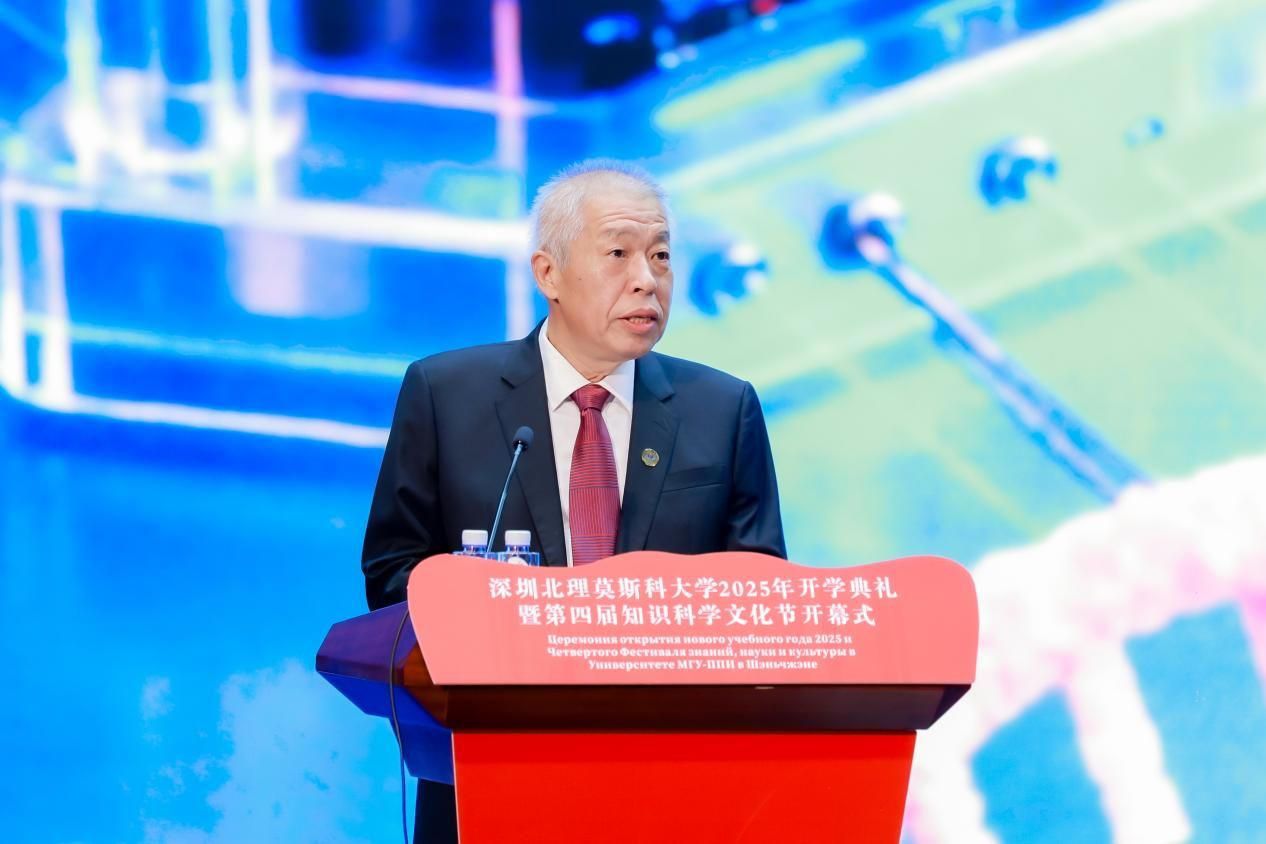
President Li Hezhang began his speech by recalling the 80th anniversary of the victory in the World Anti-Fascist War and China’s September 3rd military parade, emphasizing the deep involvement and enduring mission of universities in moments of national significance. He went on to share historical accounts of Moscow State University’s faculty and students participating in the Great Patriotic War and Beijing Institute of Technology’s contributions to the resistance movement during its Yan’an period, highlighting that the greatness of a university lies not in its towering buildings, but in its ability to unite people through culture, ignite hope through science, and transform knowledge and practice into productive power in times of crisis. He concluded that the spirit of the university represents a profound alignment between individual and nation, knowledge and society, ideals and action—an inexhaustible source of strength that drives social progress and national rejuvenation.
In the face of the profound questions and pressing challenges brought by a changing era, President Li Hezhang emphasized that universities must become sources of original innovation, arenas of value leadership, and accelerators for cultivating interdisciplinary talent. He elaborated on the unique mission and positioning of Shenzhen MSU-BIT University, the first Sino-Russian cooperative university, noting that it inherits the distinguished academic traditions of Moscow State University and Beijing Institute of Technology. With the goal of building a world-class, international, and research-oriented comprehensive university with distinctive characteristics, SMBU has developed a three-in-one high-level talent cultivation system that integrates cultural nurturing, scientific education, and innovative practice. President Li explained that this model aims to shape character through cultural nurturing, emphasizing shared values and cross-cultural understanding as its foundation; to enlighten minds through scientific education, fostering rational thinking and the pursuit of truth as the cornerstone of growth; and to empower action through innovative practice, ensuring that practical competence and problem-solving remain central to the entire educational process.
In conclusion, President Li Hezhang encouraged the new students, saying that choosing Shenzhen MSU-BIT University means embracing a way of life that values diversity, exploration, and excellence. He shared three hopes for the incoming class: He hoped that students would embrace the breadth of the world, finding their place within the global landscape of civilizations—the broader one’s vision, the wider one’s world. He hoped they would cultivate the depth of life, carving steps into the rock of truth—only with deep roots can one flourish. And he hoped they would connect breadth with depth, creating value at the forefront of their times—for only through innovation can one go far.
“Four years from now,” said President Li Hezhang, “I hope you will look back and find that: You have remained humble yet steadfast in the face of cultural differences and value conflicts; You have built a reputation for academic integrity and collaboration that others can trust; You have learned to break complex problems into verifiable, iterative components; And you have left behind innovative achievements that are measurable and enduring in key areas of study. Today, let us turn arrival into departure—
Let reason and passion move in harmony, and let truth and innovation resonate together. Congratulations on officially beginning a new chapter in your lives.”
At the graduate opening ceremony, President Li Hezhang delivered a speech titled “With Youthful Spirit, Shoulder the Responsibility of the Times, and Broaden the Path to the World.” He described himself as a “friend and fellow traveler” to the graduate students, expressing his hope to engage in open dialogue with them—sharing experiences, inspiring reflection, and witnessing their growth and transformation as they pursue truth and innovation with independence and courage. He also looked forward to mutual inspiration and shared progress through the exchange of ideas.
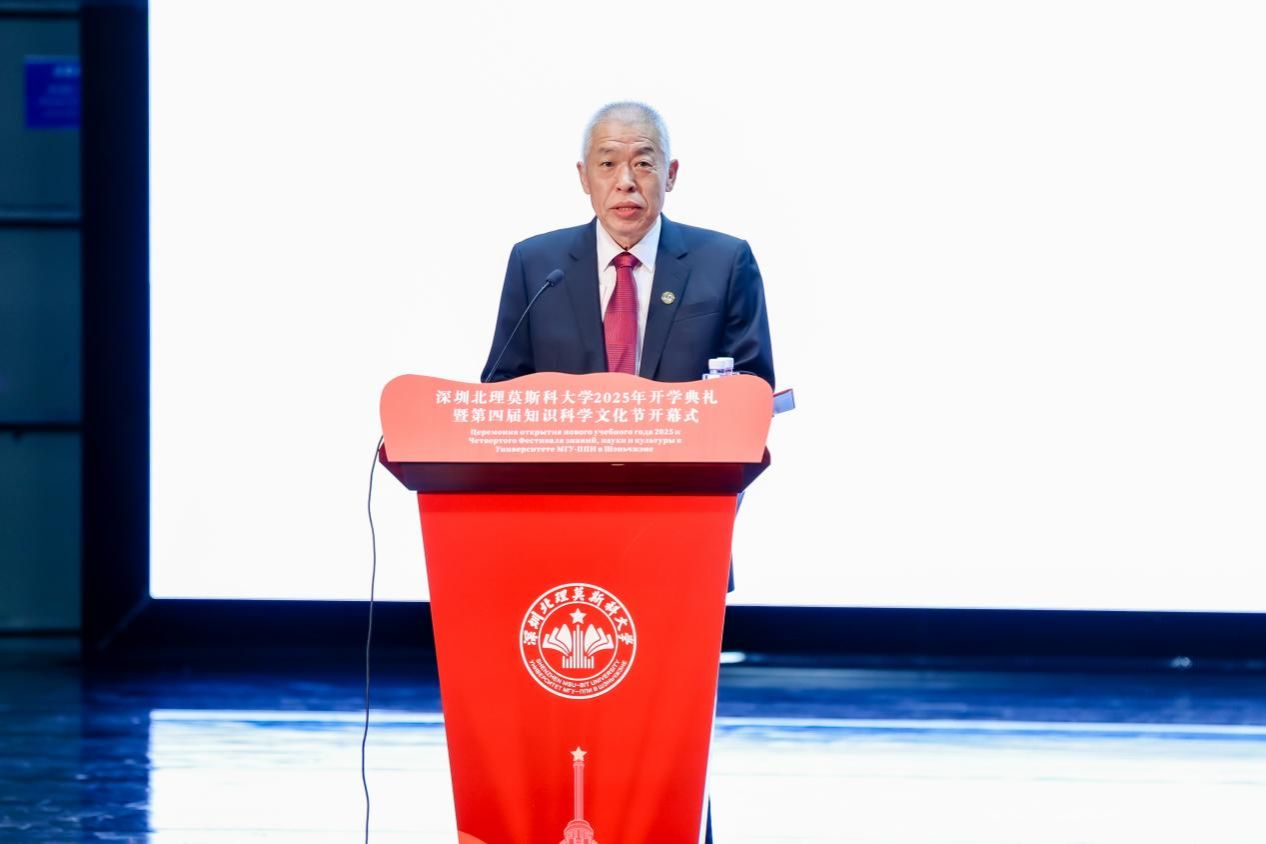
President Li Hezhang emphasized that the term “graduate student” embodies a dual mission—academic and generational. The word “research” signifies active inquiry, critical thinking, and innovative breakthroughs, marking the transition from a receiver of knowledge to a creator of knowledge and a leader of thought. The word “student” represents growth and transformation—a continual journey toward independence and maturity within the academic community. He stressed that graduate students belong not only to the academic world, but also to society and their times. Their pursuit of scholarship serves not merely personal development, but also contributes to disciplinary advancement, social progress, and national competitiveness. President Li pointed out that as the technological revolution accelerates, challenges such as the rise of new productive forces and original innovation are reshaping the world. These dynamics endow higher education with a new historical mission and define graduate students as a vital force driving this great transformation. He also provided an overview of the university’s three-in-one high-level talent cultivation system, its distinguished faculty team, cutting-edge Sino-Russian joint research platforms, and a diverse, international learning environment, giving students a clearer understanding of the rich academic and research opportunities that lie ahead.
President Li Hezhang noted that this year marks the 80th anniversary of the victory in the World Anti-Fascist War, a global conflict that not only changed the fate of nations but also profoundly shaped the course of human civilization. “History carries the past and enlightens the future,” he remarked, emphasizing that the new era calls for a new generation of youth. He reminded students that they are not only witnesses to their times, but also participants and shapers of the future. “How to seize opportunities amid change and achieve self-breakthroughs amid challenges,” he said, “is a question every one of us must contemplate.” President Li then expressed three hopes for the new graduate students: First, to embrace the world with an open mind, appreciate diversity, and find one’s greater life purpose through the mutual enrichment of Chinese and Russian cultures. Second, to pursue rationality and truth, continuously pushing the boundaries of knowledge and courageously exploring the unknown through scientific inquiry. Third, to practice boldly and innovate fearlessly, developing true innovative capability through solving real-world problems.
At the ceremony, it was also announced that the Fourth Knowledge, Science and Culture Festival of Shenzhen MSU-BIT University was officially launched. Following the undergraduate opening ceremony, university leaders and distinguished guests jointly visited the themed exhibition titled “Building a High-Level University, Cultivating High-Caliber Talent — The SMBU Practice of the China-Russia Educational Community.”
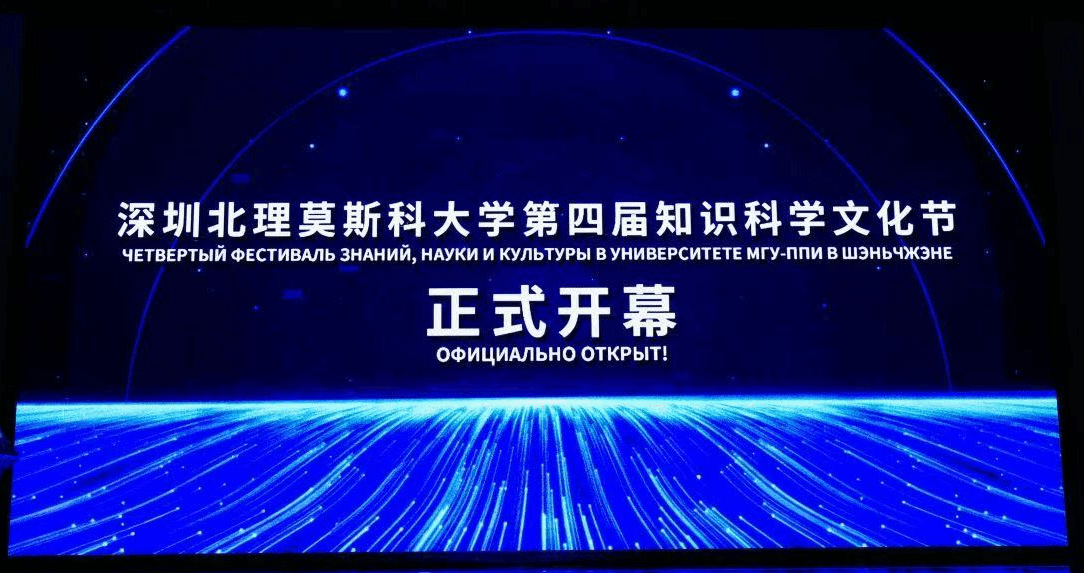
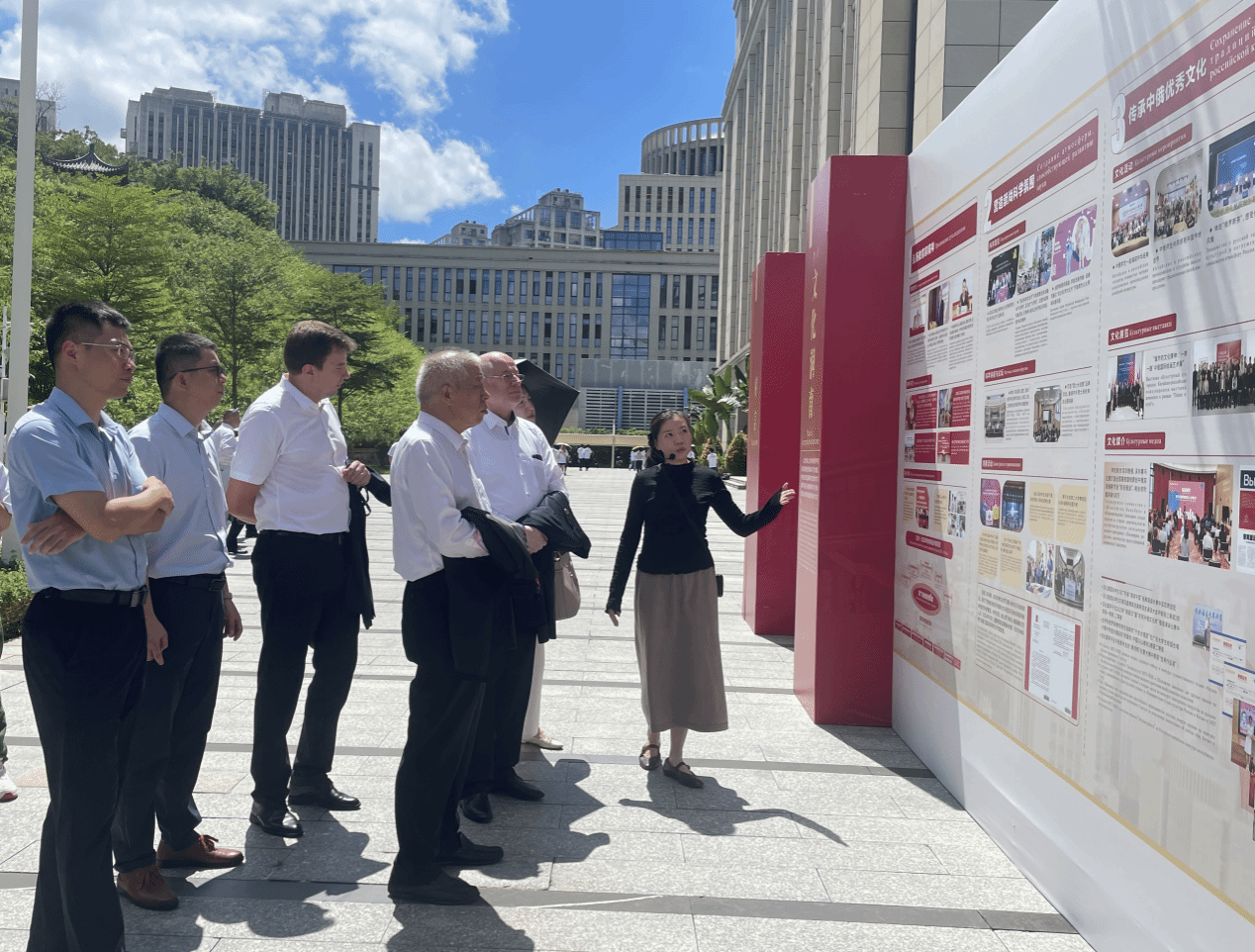
After the graduate opening ceremony, Academician Alex Kot, Fellow of the Academy of Engineering, Singapore, IEEE Life Fellow, Distinguished Professor at Shenzhen MSU-BIT University, and Chief Scientist of the Faculty of Engineering, delivered the first academic lecture of the Fourth Knowledge, Science and Culture Festival, titled “Crossing Boundaries: An Exploration of Academia and Life.” The lecture was hosted by Professor Jia Yunde, Director of the Faculty of Engineering.
